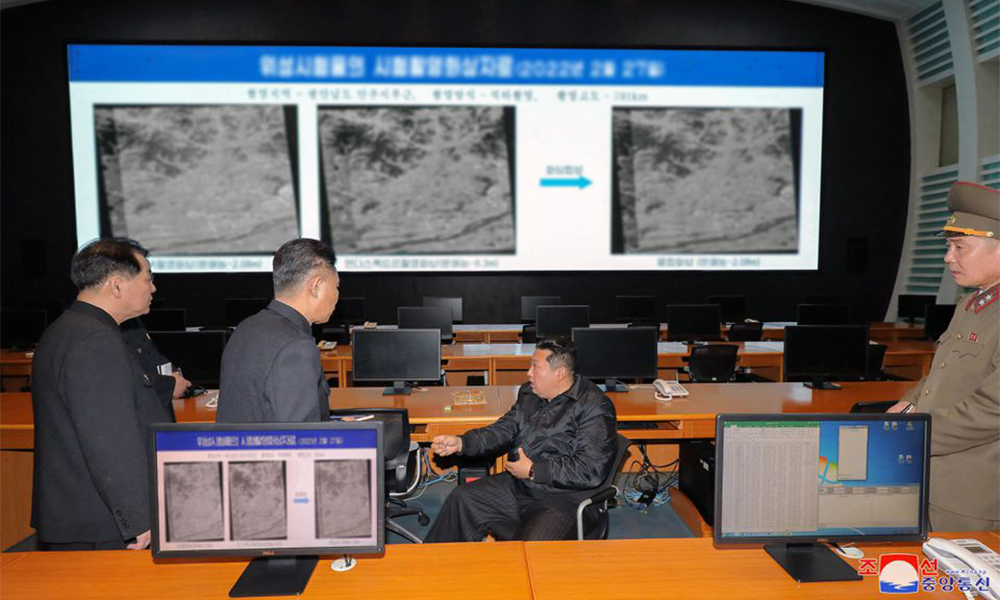Science & Technology
North Korea to launch satellites to monitor U.S. and its allies

North Korea will launch a number of reconnaissance satellites in coming years to provide real-time information on military actions by the United States and its allies, state media on Thursday reported leader Kim Jong Un as saying.
While inspecting North Korea’s National Aerospace Development Administration, Kim said “a lot” of military reconnaissance satellites would be put into sun-synchronous polar orbit in the period of a five-year plan announced last year, state news agency KCNA reported.
“He noted that the purpose of developing and operating the military reconnaissance satellite is to provide the armed forces of the DPRK with real-time information on military actions against it by the aggression troops of the U.S. imperialism and its vassal forces in south Korea, Japan and the Pacific,” the news agency said.
North Korea appears to be preparing to launch a reconnaissance satellite, which could prove as controversial as the nuclear-armed country’s weapons tests because they use the same banned ballistic missile technology, experts say.
North Korea says it conducted two tests of satellite systems on Feb. 27 and March 5. Authorities in South Korea, Japan, and the United States says the tests involved launches of ballistic missiles.
The launches drew international condemnation and the U.S. military said on Thursday it had increased surveillance and reconnaissance collection in the Yellow Sea.
The United States also said it had heightened its ballistic missile defence readiness after a “significant increase” in North Korean missile tests.
Kim defended the satellite work as not only about gathering information but protecting North Korea’s sovereignty and national interests, exercising its legitimate rights to self-defence, and elevating national prestige, KCNA reported.
“He stressed that this urgent project for perfecting the country’s war preparedness capacity by improving our state’s war deterrent is the supreme revolutionary task, a political and military priority task to which our Party and government attach the most importance,” KCNA said.
The United States and its allies have condemned previous North Korean space launches as violations of U.N. Security Council resolutions that have imposed sanctions on North Korea over its nuclear and missile programmes.
North Korea has not tested a nuclear weapon or its long-range intercontinental ballistic missiles (ICBMs) since 2017, but has suggested in could resume such tests because talks with the United States are stalled.
Its latest flurry of missile launches could be groundwork for a return to ICBM and nuclear bomb tests this year, the U.S. Directorate of National Intelligence (DNI) said in its annual Worldwide Threat Assessment released this week.
A satellite launched into orbit would be the first since 2016.
Recent sub-orbital launches, which likely used road-mobile medium-range ballistic missiles, appeared designed to “pop the key components of an imagery reconnaissance satellite up to operational altitudes for a few minutes of testing”, 38 North, a U.S.-based monitoring group, said in a report.
Such components, including satellite stabilisation, the imaging payload, and data transmission may have failed in previous tests and therefore required additional testing, the group said.
“It remains to be seen how capable any North Korean imagery satellite would be, the frequency of launches, or how many such satellites might be maintained in orbit at any one time—all key indicators of the actual military significance of such satellites,” 38 North said.
Regardless, North Korea clearly sees this capability as having propaganda value and showcasing its technological prowess and effective leadership, it added.
A launch could make technical contributions to North Korea’s ICBM capability, depending on what type of rocket booster is used, 38 North said.
“It may also be the precursor to other more provocative developments mentioned by Kim, such as the testing of multiple-warhead missiles, solid-propellant ICBMs, and ICBM-range solid-propellant submarine-launched ballistic missiles,” it said.
Science & Technology
Australia social media ban set to take effect, sparking a global crackdown
For the social media businesses, the implementation marks a new era of structural stagnation as user numbers flatline and time spent on platforms shrinks, studies show.

Australia is set to become the first country to implement a minimum age for social media use on Wednesday, with platforms like Instagram, TikTok and YouTube forced to block more than a million accounts, marking the beginning of an expected global wave of regulation.
From midnight, 10 of the biggest platforms will be required to block Australians aged under 16 or be fined up to A$49.5 million ($33 million), Reuters reported.
The law received harsh criticism from major technology companies and free speech advocates, but was praised by parents and child advocates.
The rollout closes out a year of speculation about whether a country can block children from using technology that is built into modern life. And it begins a live experiment that will be studied globally by lawmakers who want to intervene directly because they are frustrated by what they say is a tech industry that has been too slow to implement effective harm-minimisation efforts.
Governments from Denmark to Malaysia – and even some states in the U.S., where platforms are rolling back trust and safety features – say they plan similar steps, four years after a leak of internal Meta (META.O) documents showed the company knew its products contributed to body image problems and suicidal thoughts among teenagers while publicly denying the link existed.
“While Australia is the first to adopt such restrictions, it is unlikely to be the last,” said Tama Leaver, a professor of internet studies at Curtin University.
“Governments around the world are watching how the power of Big Tech was successfully taken on. The social media ban in Australia … is very much the canary in the coal mine.”
A spokesperson for the British government, which in July began forcing websites hosting pornographic content to block under-18 users, said it was “closely monitoring Australia’s approach to age restrictions.”
“When it comes to children’s safety, nothing is off the table,” they added.
Few will scrutinise the impact as closely as the Australians. The eSafety Commissioner, an Australian regulator tasked with enforcing the ban, hired Stanford University and 11 academics to analyse data on thousands of young Australians covered by the ban for at least two years.
Though the ban covers 10 platforms initially, including Alphabet’s (GOOGL.O), YouTube, Meta’s Instagram and TikTok, the government has said the list will change as new products appear and young users switch to alternatives.
Of the initial 10, all but Elon Musk’s X have said they will comply using age inference – guessing a person’s age from their online activity – or age estimation, which is usually based on a selfie. They might also check with uploaded identification documents or linked bank account details.
Musk has said the ban “seems like a backdoor way to control access to the internet by all Australians” and most platforms have complained that it violates people’s right to free speech.
For the social media businesses, the implementation marks a new era of structural stagnation as user numbers flatline and time spent on platforms shrinks, studies show.
Platforms say they don’t make much money showing advertisements to under-16s, but they add that the ban interrupts a pipeline of future users. Just before the ban took effect, 86% of Australians aged 8 to 15 used social media, the government said.
“The days of social media being seen as a platform for unbridled self-expression, I think, are coming to an end,” said Terry Flew, the co-director of University of Sydney’s Centre for AI, Trust and Governance.
Platforms responded to negative headlines and regulatory threats with measures like a minimum age of 13 and extra privacy features for teenagers, but “if that had been the structure of social media in the boom period, I don’t think we’d be having this debate,” he added.
Science & Technology
Ethiopian volcano erupts for first time in nearly 12,000 years
Ash from the eruption drifted across the region, spreading over Yemen, Oman, India, and parts of Pakistan.

The Hayli Gubbi volcano in Ethiopia’s Afar region has erupted for the first time in almost 12,000 years, sending massive ash plumes soaring up to 14 kilometres into the atmosphere, according to the Toulouse Volcanic Ash Advisory Centre.
The eruption began on Sunday and lasted several hours. Hayli Gubbi, located around 800 kilometres northeast of Addis Ababa near the Eritrean border, sits within the geologically active Rift Valley, where two major tectonic plates meet. The volcano rises roughly 500 metres above the surrounding landscape.
Ash from the eruption drifted across the region, spreading over Yemen, Oman, India, and parts of Pakistan. Satellite imagery and social-media videos captured a towering column of white smoke billowing into the sky.
The Smithsonian Institution’s Global Volcanism Program notes that Hayli Gubbi has no recorded eruptions during the Holocene, the period dating back about 12,000 years to the end of the last Ice Age.
Volcanologist Simon Carn of Michigan Technological University also confirmed on Bluesky that the volcano had “no record of Holocene eruptions.”
Science & Technology
Cloudflare outage easing after millions of internet users affected

A global outage at web-infrastructure firm Cloudflare began to ease on Tuesday afternoon after preventing people from accessing major internet platforms, including X and ChatGPT.
Cloudflare, whose network handles around a fifth of web traffic, said it started to investigate the internal service degradation around 6:40 a.m. ET. It has deployed a fix but some customers might still be impacted as it recovers service.
The incident marked the latest hit to major online services. An outage of Amazon’s cloud service last month caused global turmoil as thousands of popular websites and apps, including Snapchat, were inaccessible due to the disruption.
Cloudflare – whose shares were down about 5% in premarket trading – runs one of the world’s largest networks that helps websites and apps load faster and stay online by protecting them from traffic surges and cyberattacks.
The latest outage prevented users from accessing platforms such as Canva, X, and ChatGPT, prompting users to log outage reports with Downdetector.
Downdetector tracks outages by collating status reports from a number of sources. “We saw a spike in unusual traffic to one of Cloudflare’s services beginning at 11:20 UTC. That caused some traffic passing through Cloudflare’s network to experience errors,” the company said in an emailed statement.
“We are all hands on deck to make sure all traffic is served without errors.”
X and ChatGPT-creator OpenAI did not immediately respond to requests for comment. – REUTERS
-

 Sport4 days ago
Sport4 days agoILT20: Desert Vipers edge Gulf Giants in historic super over thriller
-

 Latest News2 days ago
Latest News2 days agoMuttaqi: Afghanistan’s progress requires both religious and modern education
-

 Regional4 days ago
Regional4 days agoSix Pakistani soldiers killed in TTP attack in Kurram District
-

 Business4 days ago
Business4 days agoTrade bodies warn almost 11,000 Afghan transit containers stuck at Karachi port
-

 World4 days ago
World4 days agoPowerful 7.6 earthquake hits northern Japan, tsunami warnings issued
-

 Latest News3 days ago
Latest News3 days agoTrump calls Afghanistan a ‘hellhole’ country as US expands immigration restrictions
-

 Sport5 days ago
Sport5 days agoSorkh Poshan Khafi defeats Sarsabz Yashlar 4-0 in Afghanistan Champions League
-

 Sport3 days ago
Sport3 days agoCommanding wins for Arman FC and Sarsabz Yashlar in Afghanistan Champions League
























